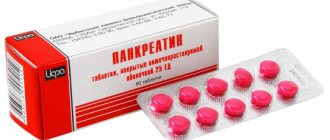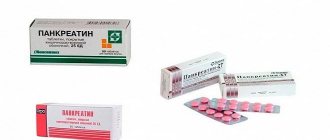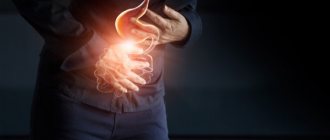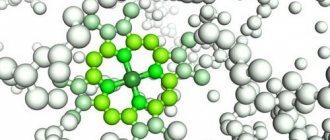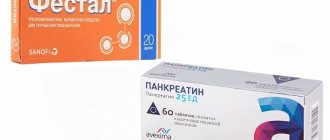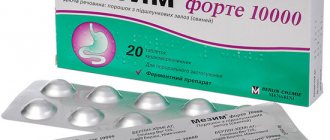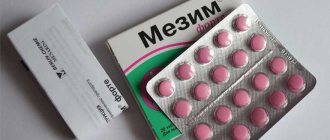The main purpose of the drug Pancreatin is to compensate for the deficiency of pancreatic enzymes.
Medicine is required for diseases of both the gland itself and other digestive organs that cause reactive pancreatitis. It is often used to restore food digestion and eliminate symptoms of disorders due to poisoning, overeating heavy or unusual foods, and alcohol intoxication. The absorption capacity of the intestine and the body’s receipt of substances important for life depend on how to take Pancreatin. The medicine is available in enteric-coated tablets. It is extracted tissue from the pancreas of pigs (closest in structure to human enzymes). The choice of the correct dose is determined by the patient’s specific pathology and age. You should take the drug only after consulting a doctor, having first read the instructions.
Release form, composition and packaging
Pancreatin is available in 3 formats: dragees, capsules and tablets. Can be packed in 20 and 100 pcs.
The 1st tablet contains:
- Diastase 12500 units.
- Protease 12500 units.
- Lipase 1000 units.
One capsule includes:
- 10 thousand, 20 thousand and 25 thousand units lipase;
- 9 thousand, 18 thousand and 22.5 thousand units of glycolidase;
- 0.5 thousand, 1 thousand and 1.25 thousand units protease.
All forms are covered with a special shell. It dissolves easily in the intestines.
The composition includes several auxiliary elements:
- sodium chloride;
- magnesium salt of stearic acid;
- polysorb;
- MCC;
- steatite;
- titanium dioxide;
- sodium croscarmellose.
Pharmacology
The Pancreatin used contains enzymes of the organ of external and internal secretion. They are required for the stable operation of the food digestion process, since with their help, proteins are broken down into glycine, starch into glucose and fats into fatty acids and glycerol.
The absence of these components can lead to inadequate digestion and absorption by the body of the necessary substances of the food consumed.
Pancreatin helps as an anesthesia, since the trypsin it contains slows down pancreatic secretions when it enters the intestinal tract and is a pepsinogen. After 30 minutes, intestinal function improves and heaviness goes away.
The easily soluble shell in an alkaline environment contains a medicinal substance that stimulates the healing process.
Beneficial properties of Pancreatin for diseases and disorders of the gastrointestinal tract
The pharmacy chain recommends domestic Pancreatin and Ukrainian Pancreatin-8000. Both analogues are presented as tablets coated with a protective coating. The qualitative composition is the same, but the Kharkov preparation has the advantage of the dosage of enzymes indicated on the packaging in accordance with international requirements. The instructions for Russian Pancreatin only indicate the weight in mg (250 and 300 mg each). This makes it difficult to calculate the daily dosage when prescribed and compare with other drugs of the enzymatic group.
One tablet of Pancreatin-8000 includes:
- lipase - 8000 units,
- amylase - 5600 units,
- proteases (including trypsin and chymotrypsin) - 370 units.
According to the manufacturer's updated data, Pancreatin contains:
- lipolytic enzyme - 4300 units,
- amylase - 3500,
- proteolytic activity - 200 units.
Each of the enzymes is indispensable for the absorption of substances supplied with food:
- lipase - promotes the production of fatty acids and glycerol from lipids,
- alpha-amylase - necessary in the processing of carbohydrates, starch,
- trypsin, chymotrypsin - breaks down complex proteins into chains of amino acids.
In a transformed form, products are absorbed in the small intestine, distributed throughout the body through the bloodstream, participate in energy production, restoration processes, secretion formation in other organs, and become coenzymes in biochemical reactions.
In the physiology of digestion, the function of the proteolytic enzymes trypsin and chymotrypsin is especially important in suppressing the activity of the pancreas and relieving pain during its inflammation.
All enzymes are released from the tablet at the border with the duodenum (DPC). The protective shell dissolves in an alkaline environment, which prevents loss of activity due to high acidity of gastric juice.
The maximum effect is recorded 30-45 minutes after swallowing the tablet. This determines compliance with the rules of administration: you should drink the drug not on an empty stomach, when there is nothing to digest, but when there is food in it (immediately before starting a meal, immediately after).
The direct purpose of Pancreatin is to compensate for decreased pancreatic function. At the same time, the activity of the entire gastrointestinal tract (GIT) is stimulated: the synthesis of hormones and secretions of the stomach, small intestine, and bile increases. There is an improvement in food processing at all levels.
The digestive process is disrupted both due to diseases of the gland and against the background of pathology of other organs. Therefore, the list of indications for prescribing Pancreatin includes organic and functional diseases of the gastrointestinal tract:
- pancreatitis in the chronic stage,
- pancreatic cysts,
- cystic fibrosis changes in cystic fibrosis,
- damage to the stomach and duodenum (gastritis, duodenitis, ulcer),
- diseases of the biliary system and liver (hepatitis, dyskinesia and cholecystitis, cirrhosis),
- postoperative disorders during resection of the stomach, intestines, cholecystectomy (for peptic ulcers, tumors, acute cholecystitis and bladder stones, intestinal obstruction and Crohn's disease),
- consequences of radiation and chemotherapy of malignant tumors.
Functional disorders must be eliminated when:
- a sudden overload of digestion after a festive feast with fatty, spicy dishes, alcohol,
- temporary decrease in mobility (with prolonged bed rest, fractures, paralysis, severe illnesses),
- pathology of the oral cavity and insufficient chewing of food,
- the need to eliminate gas bubbles and swollen intestines for a high-quality examination using ultrasound, radiography of the kidneys, liver, gallbladder, and intestines.
Indications for use of Pancreatin
Pancreatin helps in any of the following cases:
- component deficiency in case of digestive tract malaise;
- damage to other intestinal organs by the disease;
- during the rehabilitation period after a biopsy;
- overeating, heavy drinking, mandatory bed rest;
- before x-ray or ultrasound examination of the abdominal area;
- indigestion, heartburn, nausea, poisoning, diabetes, liver disease;
- with the accumulation of gases in the gastrointestinal tract.
Method of administration and dosage of Pancreatin
It is recommended to use Pancreatin before or during meals.
It helps children over 2 years old if the medicine is mixed with food. The required amount of the drug is determined taking into account the age and clinical picture of the person.
The use of the medicinal composition will help if you do not exceed 20 thousand units per day for each kg of body weight.
The duration of use of Pancreatin is determined by the attending physician.
This can take a few days (for disorders of the food digestion system, such as excess food consumption) or a lifetime (for chronic diseases).
Pancreatin will help if you take it with every meal.
The general picture of the disease and its dynamics determine the method and dosage , how to take the medicine, before or after meals, how often it should be taken. A person aged 18 years or older should take the prescribed drug no more than 6 times a day with plenty of water.
Does Pancreatin help with heartburn and other digestive problems: why take enzymes at all?
Pancreatin is a sought-after medicine in gastroenterological practice and is included in the treatment standards for almost all diseases of the gastrointestinal tract.
After all, pathologies of the digestive system are accompanied by enzyme deficiency. Pancreatin - a drug to improve digestion
Let's find out whether Pancreatin can be taken for heartburn, abdominal pain and other unpleasant symptoms, and what factors need to be taken into account.
Pancreatin is the general name for pancreatic enzymes, which include amylase, lipase and protease. Depending on the manufacturer, tablets are produced with different enzyme activities (calculation is based on protease or lipase) - from 30 IU to 3500 IU.
It works like this:
- normalizes the process of digestion of foods;
- participates in fat, carbohydrate and protein metabolism (breaks down nutrients into components - sugars, starch, amino acids, fatty acids, glycerin);
- improves the absorption of metabolites of important substances;
- stimulates bile synthesis;
- aActivates the production of enzymes;
- prevents stagnation of bile in the biliary tract;
- relieves discomfort caused by overeating;
- eliminates symptoms characteristic of enzyme deficiency - belching, heartburn, nausea, heaviness, flatulence, epigastric pain, constipation and loose stools.
Indications for use
Prescribing Pancreatin is advisable for:
- lack of enzymes (with gastrointestinal pathologies);
- cystic fibrosis, chronic pancreatitis;
- overeating;
- unbalanced diet (abundance of fatty, fried foods);
- violation of diet by patients with diseases requiring restriction of heavy foods;
- enzyme replacement therapy after resection of the gastrointestinal tract;
- gastritis with high, zero and low acidity;
- reflux disease (esophagitis);
- duodenal and stomach ulcers;
- preparation for examination of the abdominal cavity (ultrasound, x-ray, colonoscopy, etc.);
- with flatulence (accumulation of gases in the intestines);
- in postoperative rehabilitation in gastroenterology;
- during the recovery period after irradiation of the peritoneal organs (intestines, stomach, etc.);
- in the combined treatment of stool disorders (constipation, diarrhea).
Contraindications
There are a number of restrictions on the use of Pancreatin:
- individual intolerance to the components of the drug;
- chronic pancreatitis in the acute stage;
- acute pancreatitis.
Pregnant women should take it with caution, as prescribed by a doctor, since the safety of the medicine has not been sufficiently studied.
General recommendations
Pancreatin is taken before or with food.
A single dose ranges from 1 to 3 tablets, depending on the diagnosis.
The tablets are taken while maintaining an upright body position.
The integrity of the tablet should not be violated (break, chew) in order to avoid premature activation of enzymes and their irritating effect on the upper gastrointestinal tract.
Frequency of administration: 3 times a day (with food, once).
If the discomfort is not systematic and is not associated with any disease, 1-2 doses are sufficient.
In other cases, the duration of treatment ranges from 5 days to continuous, lifelong use (after removal of organs or parts thereof).
Higher dosages can only be prescribed by a doctor.
We recommend reading:
Use for heartburn
Before drinking Pancreatin during heartburn, it is necessary to determine the cause that caused this symptom. One of the possible ones is a disease of the sphincters that limit the release of stomach contents into the esophagus (esophagitis). Only a doctor can make an accurate diagnosis.
Enzymes will be effective if heartburn occurs due to:
- eating spicy, fried, fatty or smoked foods (caused by irritation of the gastric mucosa);
- overeating;
- gastritis;
- reflux esophagitis disease;
- peptic ulcer of the stomach and duodenum;
- enzyme deficiency;
- stagnant processes.
Note! Pancreatin is incompatible with antacids, which are used as a symptomatic remedy to suppress the burning sensation. The interval between taking medications is 2 hours.
Pancreatin for gastritis with high acidity regulates the pH balance in the lumen of the stomach - prevents excessive secretion of hydrochloric acid and normalizes digestion.
To treat heartburn, it is recommended to take 2-3 tablets 3 times a day before meals (along with the main meal).
Duration of use: 10 days.
The use of Pancreatin for heartburn in pregnant women is ineffective, since the cause is compression of the pelvic organs by the growing uterus. In this case, it is enough to limit yourself to the use of medications aimed at eliminating the symptom.
We recommend that you read:
- Almagel for heartburn;
- treatment of heartburn accompanied by stomach pain.
Pancreatin for gastritis
In case of exacerbation of chronic gastritis, Pancreatin is used only as symptomatic therapy. The main condition is impaired digestion of food, lack of enzymes. Treatment of gastritis involves the use of antibiotics, antisecretory drugs (Omeprazole) or antacids.
Most often, Pancreatin is recommended for adults and children with acute infectious gastritis or gastroenteritis. Indications for the prescription of pancreatic enzymes are the appearance of greasy shine and undigested dietary fiber in the stool.
In both cases, Pancreatin is prescribed according to the standard regimen:
- children 50,000 -100,000 units per day with meals;
- adults: 150,000 units per day, also with meals.
Tablets, pills or capsules must be swallowed whole with plenty of non-alkaline liquid (fruit juices, purified water).
Treating stomach pain
The cause of pain in the stomach can be functional dyspepsia, exacerbation of gastritis or peptic ulcer, food poisoning. Against the background of pathological processes in the stomach, poorly digested food enters the duodenum, where bile and pancreatic enzymes already do their job.
In some cases, the functioning of the pancreas also suffers, which is manifested by bloating, upset stool and the appearance of undigested food and neutral fats in it. This is confirmed by characteristic complaints and laboratory test results.
Only with a confirmed deficiency of pancreatic enzymes are their synthetic analogues such as Pancreatin prescribed:
- 1 tablet with meals;
- frequency of use – 3 times a day;
- Duration of therapy is 5-10 days.
Uncontrolled use of Pancreatin, especially in the absence of indications, can lead to a decrease in the production of its own enzymes by the pancreas. Stomach pain can be eliminated with painkillers or antispasmodics (Ketanov, Duspatalin, Drotaverine).
Pancreatin for stool disorders
Enzyme deficiency can change the nature of stool - causing chronic constipation or diarrhea. Before starting treatment, it is necessary to exclude other reasons that could cause these changes.
Possible causes of constipation:
- intestinal obstruction;
- dysbacteriosis;
- use of fixative foods and preparations.
Diarrhea may occur due to:
- intestinal infection;
- food or drug poisoning;
- metabolic disorders;
- insufficient secretory function of the intestines and pancreas;
- intestinal dysbiosis;
- taking medications that have diarrhea as a side effect.
The positive effect of using Pancreatin can be observed in case of diarrhea or constipation caused by a deficiency of its own enzymes.
Pancreatin acts on the intestines due to:
- increasing the enzyme activity of internal organs;
- enhancing the absorption of nutritional compounds;
- strengthening of weak secretory function.
In any of these cases, the use of enzymes alone is not enough. They are an aid.
Enzymes are used to enhance the effect of use:
- laxative tablets, syrups, suppositories, enemas and microenemas;
- antidiarrheal drugs (sorbents, probiotics, antibiotics).
To eliminate diarrhea or constipation, take 2 tablets 3 times a day for 10 days.
Bloating
Increased gas formation in the intestines and bloating are most often a consequence of:
- overeating;
- irritable bowel syndrome, chronic colitis;
- acute intestinal infection;
- functional dyspepsia;
- chronic pancreatitis.
Pancreatin can help eliminate bloating if it is caused by impaired functioning of the pancreas (acute intestinal infection with malabsorption syndrome, chronic pancreatitis).
In other cases, it is recommended to take drugs based on Semitecon (Espumizan). They change the surface tension of gas bubbles in the stomach and intestines, which leads to their destruction or expulsion.
Sorbents have a somewhat lesser effect in the fight against flatulence.
Pancreatin helps eliminate excess gases in the intestines due to:
- normalization of the process of digestion and absorption of substances;
- reducing fermentation processes.
For bloating, it is recommended to take 2-3 tablets with meals for 10-14 days. The drug should be used only after consultation with a doctor.
The use of Pancreatin allows you to solve many problems in the digestive system, which can arise independently or against the background of other diseases.
With a correctly determined diagnosis and selected therapy, enzymes help get rid of heartburn, belching, diarrhea and chronic constipation, flatulence, and heaviness in the stomach.
The main thing is to follow the doctor’s recommendations and instructions for use.
Source: https://lechigastrit.ru/lekarstvennye-sredstva/pankreatin-ot-izzhogi-i-problem-s-pishhevareniem.html
Use of Pancreatin during pregnancy and breastfeeding
The answer to this question cannot be unambiguous. But, if a woman during lactation or pregnancy has a problem associated with a disorder of the digestive system and she does not have any indicators of intolerance to individual components of Pancreatin, then this method of treatment may help.
The main thing in this case is to strictly follow the instructions prescribed by your doctor. The period of gestation is the most dangerous for both the baby and the mother. Failure to follow the rules can lead to the development of pathologies.
Use in children
The use of Pancreatin is prohibited for children under 2 years of age. Remember that the dose is prescribed for each child individually, depending on the age and characteristics of the disease.
Self-medication can lead to the development of chronic diseases or disruption of the child’s digestive system.
Pancreatin helps if you follow the recommendations:
- children aged 7 years no more than one tablet per day during meals;
- children aged 7-9 years no more than two tablets per day during meals;
- Children who have reached adolescence (9-18 years old ) can increase the dose, but only as prescribed by the doctor, up to three times a day during meals.
general characteristics
Pancreatin is the general name for pancreatic enzymes, which include amylase, lipase and protease. Depending on the manufacturer, tablets are produced with different enzyme activities (calculation is based on protease or lipase) - from 30 IU to 3500 IU.
It works like this:
- normalizes the process of digestion of foods;
- participates in fat, carbohydrate and protein metabolism (breaks down nutrients into components - sugars, starch, amino acids, fatty acids, glycerin);
- improves the absorption of metabolites of important substances;
- stimulates bile synthesis;
- aActivates the production of enzymes;
- prevents stagnation of bile in the biliary tract;
- relieves discomfort caused by overeating;
- eliminates symptoms characteristic of enzyme deficiency - belching, heartburn, nausea, heaviness, flatulence, epigastric pain, constipation and loose stools.
Application for weight loss
Based on the instructions for use listed above, the question remains whether Pancreatin helps you lose weight. No highly qualified doctor will prescribe it for weight loss. They claim that Pancreatin helps by establishing a barrier to the appearance of fat deposits.
Do not confuse a sedentary lifestyle with weight control. Pancreatin helps only in cases of improving the processes of the digestive system.
The dosage should be calculated in each individual case, depending on the reason for the need to take the drug, then the drug will help.
In order to lose weight, nutritionists recommend the minimum allowable amount - one tablet during each meal (25 units at a time).
When treating an insufficient amount of enzyme, it is recommended to take no more than 100 units, that is, 4 tablets. The maximum daily intake for an adult should not exceed 400 units per day. Abuse is dangerous due to constipation. The drug does not help with acute pancreatitis and constipation.
General recommendations
Pancreatin is taken before or with food.
A single dose ranges from 1 to 3 tablets, depending on the diagnosis.
The tablets are taken while maintaining an upright body position.
The integrity of the tablet should not be violated (break, chew) in order to avoid premature activation of enzymes and their irritating effect on the upper gastrointestinal tract.
Frequency of administration: 3 times a day (with food, once).
If the discomfort is not systematic and is not associated with any disease, 1-2 doses are sufficient.
In other cases, the duration of treatment ranges from 5 days to continuous, lifelong use (after removal of organs or parts thereof).
Higher dosages can only be prescribed by a doctor.
We recommend reading:
- why you can’t drink alcohol while taking Creon;
- taking enzymes in the treatment of pancreas;
- cheap analogues of Xenical.
Overdose
Studies have shown that with long-term use of the medication, no risk of overdose was observed.
It cannot cause harm as it helps in the production of an enzyme by the pancreas.
From another point of view, the drug is safe to use, but you should always remember the dose quantity.
In case of overdose, it will not help and can lead to an allergic result.
Also, if you ignore the instructions for use, it can lead to an increase in the amount of biogenic uric acid in urine.
Pancreatin for gastritis
In case of exacerbation of chronic gastritis, Pancreatin is used only as symptomatic therapy. The main condition is impaired digestion of food, lack of enzymes. Treatment of gastritis involves the use of antibiotics, antisecretory drugs (Omeprazole) or antacids.
Most often, Pancreatin is recommended for adults and children with acute infectious gastritis or gastroenteritis. Indications for the prescription of pancreatic enzymes are the appearance of greasy shine and undigested dietary fiber in the stool.
In both cases, Pancreatin is prescribed according to the standard regimen:
- children 50,000 -100,000 units per day with meals;
- adults: 150,000 units per day, also with meals.
Tablets, pills or capsules must be swallowed whole with plenty of non-alkaline liquid (fruit juices, purified water).
Interaction with other drugs
- When taking Pancreatin together with an antacid containing calcium carbonate or magnesium hydroxide, a reduced effectiveness of the medication is observed. The drug will help, but the clinical effectiveness of acarbose will decrease.
- If taken simultaneously with iron-containing medications , iron absorption may be reduced.
- Allohol is a medicinal product that is widely used for the prevention of the body’s immune system and in the treatment of chronic diseases. When choosing the correct dosage, Pancreatin can be taken in combination with Allochol.
Pancreatin: rules of administration for adults
Adults, with their unhealthy lifestyle and eating behavior, provoke gastrointestinal diseases. With gastritis, peptic ulcer, cholecystitis, the pancreas necessarily suffers. The unified digestive system tries to compensate for the failure of the function of some link, then the overload turns into organic pathology. The most severe lesion is acute pancreatitis with necrosis and septic complications.
Chronic inflammation of the pancreas will require constant diet and Pancreatin intake. The dosage may need to be increased with each exacerbation. The use of the drug is the only way to slow down the process of replacing functioning gland parenchyma with scar tissue.
For pancreatitis with a high degree of enzyme deficiency, a large amount of enzymes is needed. To do this, it is more advisable to replace Pancreatin with other analogues (Creon, Micrasim), which differ in their capsule form and content inside the microspheres. In them, the active substance (pancreatin) is completely delivered to the small intestine. While large Pancreatin tablets are retained in the stomach during the passage of the pyloric sphincter, they are partially deactivated.
The drug is more indicated for the prevention of exacerbations of pancreatitis, in the fight against digestive disorders after a feast. To speed up progress after taking it, it is recommended to stand for a few minutes and walk around. The main thing is not to lie down on the sofa.
Advertising of Pancreatin treatment for obesity or an easy way to lose weight is completely unfounded from a medical point of view. The dose taken helps the absorption of fats from food and does not affect endogenous or subcutaneous deposits. The lipase enzyme is very sensitive to any disturbances; there is no substitute for it in the secretions of other organs, and the fatty acids produced are needed to form the composition of bile.
Therefore, the enzyme activity of Pancreatin and other drugs of the group is usually assessed in international lipase units. Amylase and proteolytic enzymes are included in the preparation in proportions typical of pancreatic juice of a healthy person.
The tablets should not be taken on an empty stomach. Once on the empty mucous membrane, enzymes begin to digest it. The drug should be taken during meals, immediately before or immediately after, so that the enzymes enter the stomach along with the food. The maximum activity of the components is recorded after 30-45 minutes.
Patients make mistakes when they try to chew, crush or divide the tablets into pieces. Such actions destroy the protective shell of the tablet and “release” enzymes into the oral cavity. Here they have nothing to digest, so there is an aggressive effect on the mucous membrane (stomatitis, ulcers).
To drink the medicine, it is recommended to drink regular or mineral alkaline water without gas. Enough volume for a glass.
Against the background of increased acidity and the use of antacid medications (containing bismuth, aluminum, magnesium salts), enzymes are destroyed. For safety, it is necessary to include breaks of 1.5-2 hours in the consumption schedule. If proton pump inhibitors are prescribed, then it is enough to drink them 20 minutes before meals (Omez, Omeprazole).
For diseases of the stomach, gallbladder, and liver, special agents must be included in the complex of therapy, and enzymes are of an auxiliary nature. To find out how you should drink Pancreatin in a specific situation, you need to consult a doctor and undergo an examination.
The use of Pancreatin does not guarantee a cure, does not improve the condition if the patient violates the recommendations of doctors, continues to drink alcoholic beverages, or does not follow a diet.
Diet medication
Pancreatin helps for treatment purposes and does not require a specific type of diet, but you should still follow some of the recommendations of your doctor.
- You should remove everything fatty, fried, greens, legumes, mushrooms from your daily diet ; you should completely give up alcohol, sweets, baked goods, and other things.
- In turn, you need to add boiled lean pork, more vegetables, dairy products and try to steam food.
- Treatment with Pancreatin is based on split meals. It is necessary to increase the number of food intakes and at the same time reduce portion sizes.
- The ideal diet during the recovery of the body would be 4-5 meals a day during the entire course of treatment, since Pancreatin is taken strictly before eating.
special instructions
When treating cystic fibrosis with Pancreatin, you need to be extremely careful in selecting the required dosage.
People who have this disease should not take tablets of more than 10 thousand units in one day, since there is a risk of the formation of new adhesions in the patient’s ascending colon and ileocecal compartment. The consequence is the occurrence of fibrous colonopathy.
It is worth knowing that treating children with medication at a young age increases the possible occurrence of constipation. In such cases, a gradual increase in doses is necessary.
Price
Based on data provided by pharmacies in the Belgorod region, Pancreatin is sold by 4 pharmaceutical companies. The price per package depends on the manufacturer brand, the number of tablets in one package and their content.
Average cost in the Russian Federation:
| Manufacturer | How many pieces in a package | Cost, rub. |
| Biosynthesis | 20 | 22 |
| Pharmstandard | 50 | 65 |
| AVVARUS | 60 | 82 |
| Irbitsky HFZ | 60 | 56 |
The cost of the packages indicated in the table does not include the price for delivery of an order from an online store by mail or courier delivery, promotions, discounts and sales.
Analogues and cost per package
There are several analogues of this medication:
- Digestal. Approximate cost 110 rubles. Helps when: Poor functioning of the pancreas;
- Chronic gastrointestinal disease;
- For the correct process of assimilation of food for people with normal functioning of the gastrointestinal tract and poor nutrition;
- When examining organs in the abdominal area using X-ray and ultrasound equipment.
Biozyme
Digestal
Hermital
Festal
Enzistal
Creon
Mezim Forte
Micrasim
Panzinorm
Penzital
What to choose – Creon or Pancreatin?
When choosing remedies that help, the question always arises which drug is better. Pancreatin is a domestic product, and Creon is a foreign product.
In their pharmacology and component composition, Pancreatin and Creon are similar. But it is better for children to take Creon. It contains many microspheres with acid-resistant shells.
Creon is recommended for use in infants. The capsule opens easily, the contents are mixed with milk and given before each feeding of the baby.
What to choose - Mezim or Pancreatin?
Instead of Pancreatin, you can take Mezim, since it is its analogue. It is available in the form of tablets, each of which contains 3.5 thousand or 10 thousand units of lipase.
The coating of each tablet includes simethicone, which prevents increased gas formation and bloating in the abdominal cavity. It is produced by a German pharmaceutical company. The difference between Pancreatin and Mezim is only in the quantitative content of lipase.
Treating stomach pain
The cause of pain in the stomach can be functional dyspepsia, exacerbation of gastritis or peptic ulcer, food poisoning. Against the background of pathological processes in the stomach, poorly digested food enters the duodenum, where bile and pancreatic enzymes already do their job.
In some cases, the functioning of the pancreas also suffers, which is manifested by bloating, upset stool and the appearance of undigested food and neutral fats in it. This is confirmed by characteristic complaints and laboratory test results.
Only with a confirmed deficiency of pancreatic enzymes are their synthetic analogues such as Pancreatin prescribed:
- 1 tablet with meals;
- frequency of use – 3 times a day;
- Duration of therapy is 5-10 days.
Uncontrolled use of Pancreatin, especially in the absence of indications, can lead to a decrease in the production of its own enzymes by the pancreas. Stomach pain can be eliminated with painkillers or antispasmodics (Ketanov, Duspatalin, Drotaverine).
